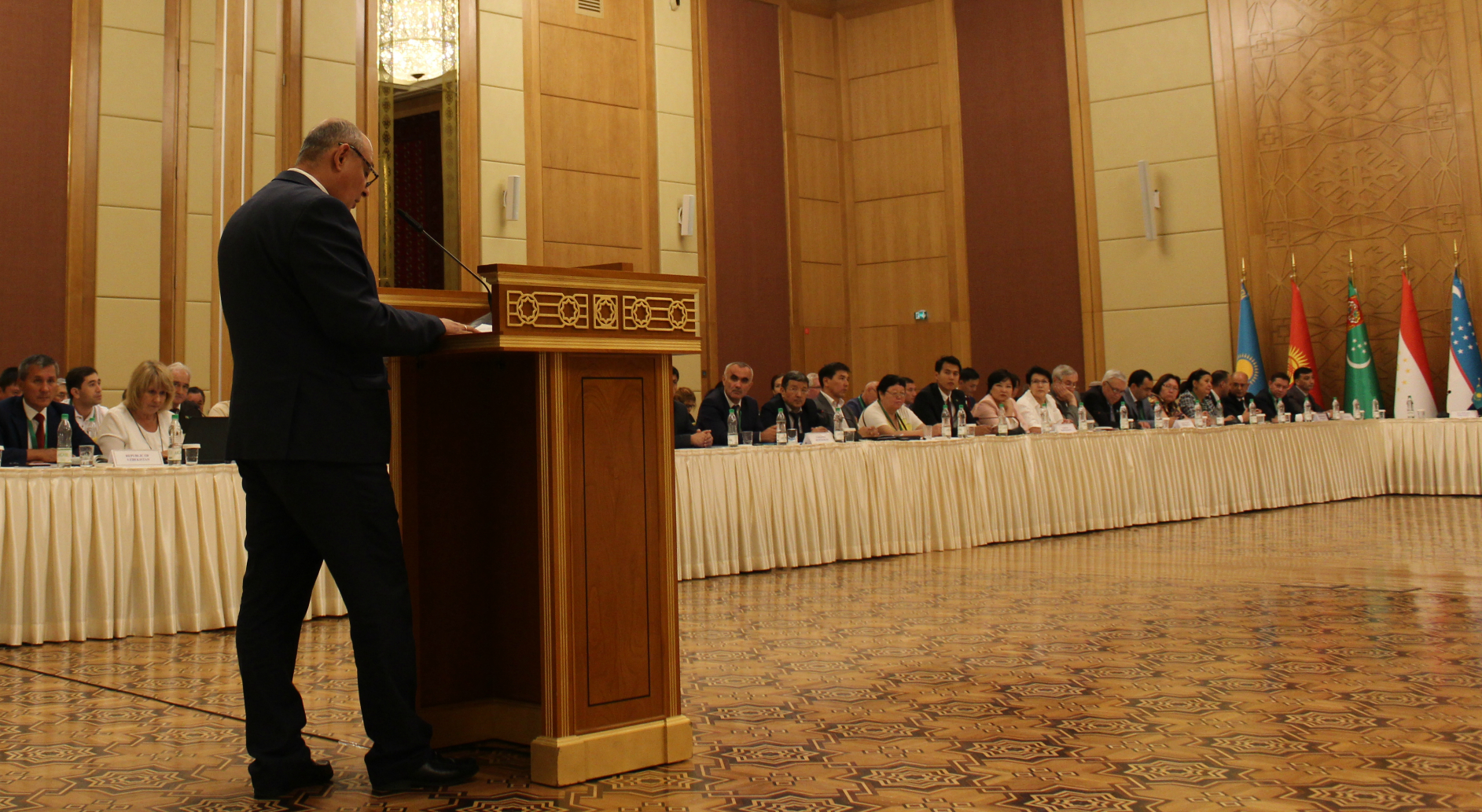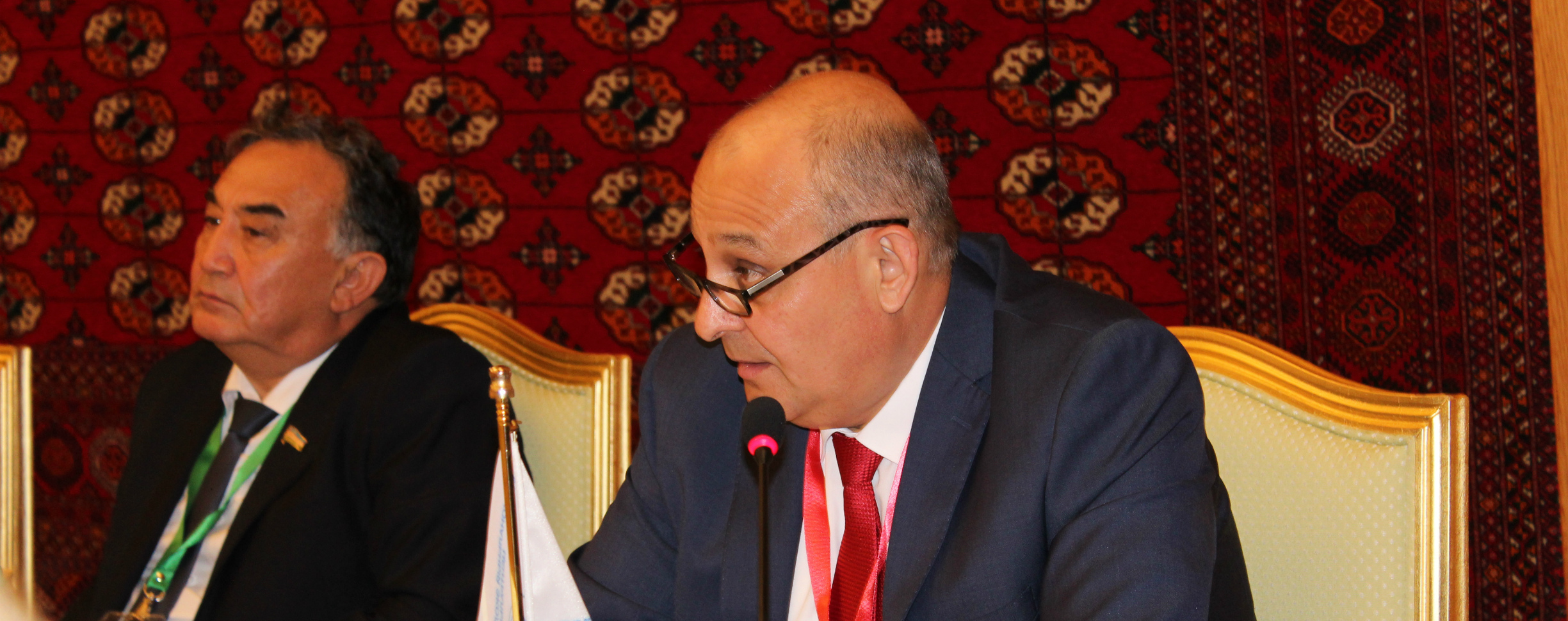Iskandar Abdullaev: «Let’s take stock: what we are doing and where we are heading to»
Early June this year, Ashgabat hosted the Central Asian International Environmental Forum, organized by CAREC in cooperation with the State Committee for Environmental Protection and Land Resources of Turkmenistan.
The first day of the forum was held in the format of thematic reports, and the second was devoted to detailed discussions and panel sessions on climate change and water resources management. Within the framework of the third day, six parallel discussions took on the reduction of climate risks in Central Asia, green investments as an opportunity for sustainable development, the interconnection of water, energy, and ecosystems. etc.
Read the interview with Dr. Iskandar Abdullaev, Executive Director of CAREC, on the main outcomes of the Central Asian International Environmental Forum and changes in better understanding of regional environmental challenges.

_____________________
- Let's start with a quick look at the historical background. Please tell us more about how the idea of holding such a large-scale event as the Central Asian International Environmental Forum was born?
- In 2013, when we made a strategic plan for the development of CAREC, we faced information gaps around the questions of who, what and where in addressing environmental issues in Central Asia. More precisely put, there was a large number of players at the regional level including both international partners and regional organizations which formed a complex nature of coordination. We wanted more concerted and consolidated actions in moving environmental cooperation forward – as this way we can improve the impact.
We started with small steps meeting with our partners on different platforms. For example, CAREC began to participate in the ICSD meeting from the very first day. There we listened to what others are doing and shared what we do. Eventually we understood that there are a few other questions going beyond the ICSD discussions.
Therefore, on the occasion of the 15th anniversary, CAREC gave a try to assemble partners and experts from various fields of environmental protection at one discussion forum. We consolidated this approach with the endorsements of the ministers of our countries who supported this initiative.
Now we say, this is the forum of the Central Asian countries - that is completely in line with their priorities and interests.
- You’ve mentioned one of the main features of the forum, which is an interdepartmental and interdisciplinary exchange of views and knowledge. Why is it so important? Doesn’t this comprehensiveness undermine the clarity of certain concrete questions leaving them out of sight?
-Let me underline that we do not separate specialists of water resource management from power engineers and ecologists. We want them to communicate with each other, because we need intersectoral approach in solving the issues, we cannot find solutions within only one problem and through one discipline.
For example, water resources management is relevant to the issues of energy, agriculture, and environmental protection. Similarly, climate change - it is not selective in relation to a particular country or a discipline - so much of these issues are interrelated.
- You opened the forum and summarized some sessions. What can you say about the existing obstacles to regional cooperation in the field of environmental protection?
- First of all, we must understand that, despite the fact that there are common issues, there are also diving ones.
With regard to water resources management, for example, there is still no clear solution, as to how we use transboundary water resources. Upstream countries toned to use for energy needs. And, this development in the energy sector create difficulties for downstream ones, particularly in the field of agriculture, food security and the environment. This is a stumbling block to cooperation.
Another block is even more serious. As you understand, for 25 years we have created certain economic modules in each country, but among our countries there is no such a strong economic union - connection is very fragile. When there is no economic interaction and exchange, there is a sense of competition in everything, including natural resources. Due to weak economic integration among our five countries, there are a lot of controversial engagements in cooperation.
- In this case, how true is it today to say that the countries of Central Asia are ready for environmental cooperation, for accepting an understanding of regional unity?
- I can confidently say that today the countries of Central Asia understand that further ignoring environmental problems is costlier for their economies. Growth at the expense of exploiting natural resources is not the way forward, but a deadlock.
In all our countries, this has been in the circle of discussions for the past five years - see what laws are being elaborated, what priorities are being set - greening the economy, renewable energy sources, and sustainable growth. Most of the problems that countries face in achieving sustainability goals do not have state borders.
This catalyzes an opportunity for cooperation on the other hand - the countries are more open to work so that their efforts lead to a widespread effect. This is the perception that has already developed in the region as a good basis for dialogue. We, figuratively speaking, build the road. Without the road, this process cannot be launched.
- And on this road the issues of water and energy problems, degradation of land resources and biological diversity are especially important for Central Asia. Were there other problems mentioned during the forum?
- Yes. For example, municipal solid waste. For a long time, we had certain limitations in consumption, when there was not much choice. Now we have become a consumer society. Our daily life forms a large amount of municipal solid waste.
It may now seem to us not so terrible, but one already can see the destruction of soils and certain large areas that remain under rubbish.
- Taking this into consideration, is it possible to say that this area needs for investment?
- Absolutely, yes. We need to forget the understanding that nature protection is a financial burden. Protection of nature is an opportunity for attracting investments as well. The recycling materials, for example, can be reused. This is just one example.
If we take care the environment, there will be national parks, where you can attract tourists. This is also our highland areas, which climbers from all over the world are dreaming to visit, and steppe zones, and unique natural phenomena.
- For sure during the work you faced skepticism about holding such big meetings like CAIEF as a platform to strengthen regional environmental cooperation. What can you say to those people today who still face skepticism in this regard?
-The fact that there is skepticism and criticism is good. I think we should not overestimate the opportunities for dialogue that the forum creates. This should be a permanent and integrated partnership process.
During my speech, I announced the cost of lack of regional cooperation. It is a loss of up to 20% of the regional gross income by 2020, according to the calculations of the World Bank. And this is a significant figure.
Look at those states that brought their countries to the point of no return - for example, in Africa. We also have already destroyed a lot: we have lost the Aral Sea; we have a bad situation at Balkhash. At the same time, the region's biological wealth is decreasing, which leads to a less attractive environment in terms of both tourism and investment.
Several countries together can do a lot. And the earlier, the better. This is repeated also by the Central Asian countries themselves. This is a sign that understanding has matured not only at the level of experts, but also at the level of policy-makers.

- To sum up, what will be done by CAREC based on the results of the forum?
- First of all, there is the work on the Roadmap for the "Environment for Central Asia" process, which should reflect what we will do, which participants and for what will be responsible, who will act as partners. This is an approach where everyone knows own role in this process, which is a joint promotion of the solutions on environmental protection and sustainable development.
Second, we must analyze what is being done in the sphere of environmental protection from the perspectives of successful examples, searching for areas where practical implementation can begin today, as well as defining critical issues for the agenda of the next forum.
The working group will include representatives of countries and representatives of international and regional organizations, in order not to miss anyone’s interest, this process will not work.
- Then perhaps it is important to emphasize to what degree the interests of countries will be considered
- This is a sensitive and very important moment when we are looking for non-controversial areas. The way out here is that we work on this with an approach in mind “here we can work together” rather than “consider all my interests”.
At the forum, someone said: "We need to do this in that way, where all the problems will be solved simultaneously." But there is no such a solution, and there will never be a one - it is necessary to move systematically and step by step. And, start with what is already ripe today and in the process, we will find even more common interests.
- So, it is such a flexible process.
- Yes, indeed where we can stop and say: "Guys, let's take stock what we are doing and where we are heading
